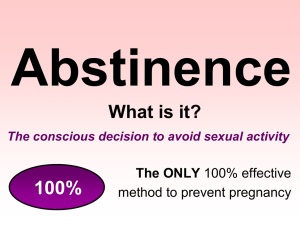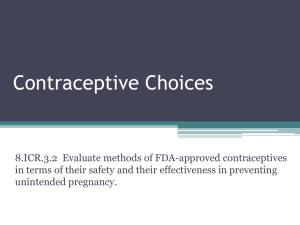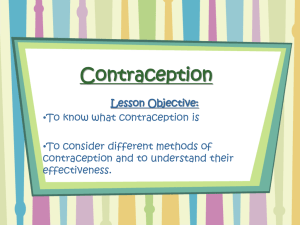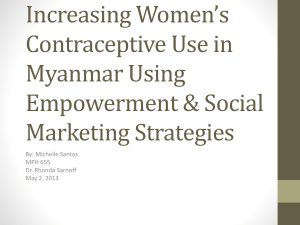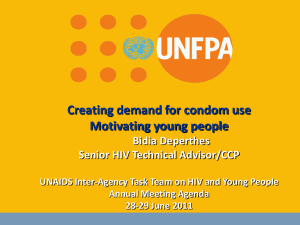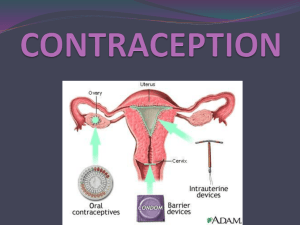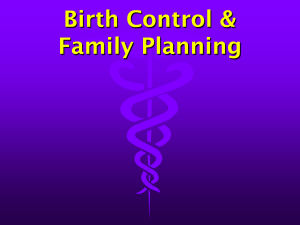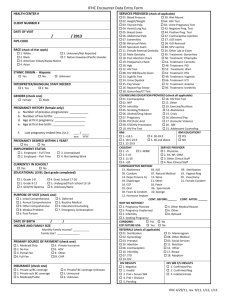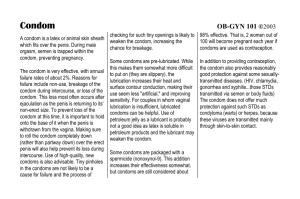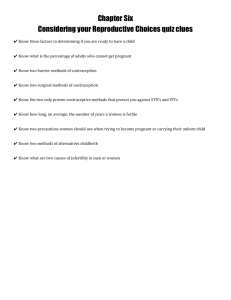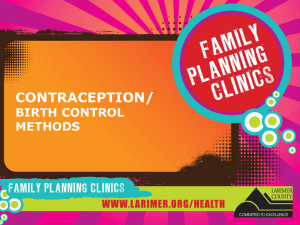Script for Contraceptive Choices
advertisement
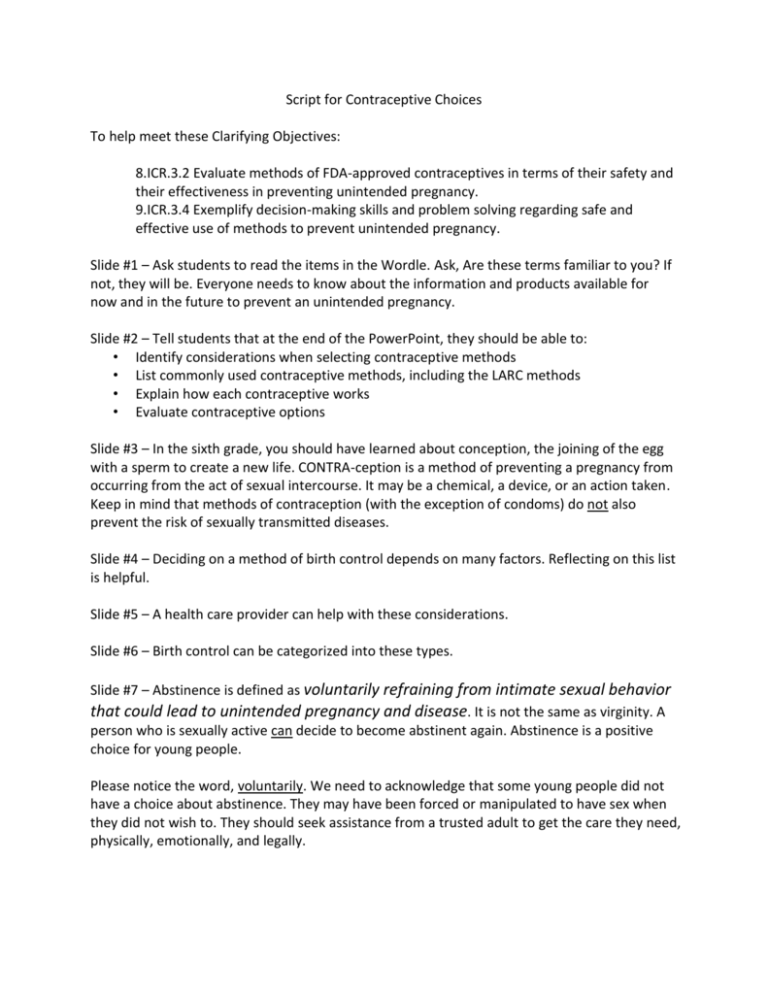
Script for Contraceptive Choices
To help meet these Clarifying Objectives:
8.ICR.3.2 Evaluate methods of FDA-approved contraceptives in terms of their safety and
their effectiveness in preventing unintended pregnancy.
9.ICR.3.4 Exemplify decision-making skills and problem solving regarding safe and
effective use of methods to prevent unintended pregnancy.
Slide #1 – Ask students to read the items in the Wordle. Ask, Are these terms familiar to you? If
not, they will be. Everyone needs to know about the information and products available for
now and in the future to prevent an unintended pregnancy.
Slide #2 – Tell students that at the end of the PowerPoint, they should be able to:
• Identify considerations when selecting contraceptive methods
• List commonly used contraceptive methods, including the LARC methods
• Explain how each contraceptive works
• Evaluate contraceptive options
Slide #3 – In the sixth grade, you should have learned about conception, the joining of the egg
with a sperm to create a new life. CONTRA-ception is a method of preventing a pregnancy from
occurring from the act of sexual intercourse. It may be a chemical, a device, or an action taken.
Keep in mind that methods of contraception (with the exception of condoms) do not also
prevent the risk of sexually transmitted diseases.
Slide #4 – Deciding on a method of birth control depends on many factors. Reflecting on this list
is helpful.
Slide #5 – A health care provider can help with these considerations.
Slide #6 – Birth control can be categorized into these types.
Slide #7 – Abstinence is defined as voluntarily refraining from intimate sexual behavior
that could lead to unintended pregnancy and disease. It is not the same as virginity. A
person who is sexually active can decide to become abstinent again. Abstinence is a positive
choice for young people.
Please notice the word, voluntarily. We need to acknowledge that some young people did not
have a choice about abstinence. They may have been forced or manipulated to have sex when
they did not wish to. They should seek assistance from a trusted adult to get the care they need,
physically, emotionally, and legally.
Slide #8 – In this slide, we see some of the advantages of choosing to be abstinent. Yet
abstinence is similar to methods of birth control in that it must be practices consistently and
correctly. A teen cannot expect to avoid the risks associated with sexual behavior if they are
only abstinent some of the time.
Slide #9 – Barrier methods include the male and female condom. Please read this information.
Condoms are easily accessible and afford the extra benefit of protection against sexually
transmitted disease and infections. Condoms are highly effective against the transmission of
HIV and other STDs as well as preventing pregnancy.
Slide #10 – The MOST effective forms of birth control are the hormonal methods. Read the
information on the slide and notice the high level of effectiveness.
Slide #11 – By the end of the lesson, you will be able to rank order these methods based on
effectiveness.
Slide #12 – Doctors and scientists rate birth control effectiveness in two ways: “typical use” and
“perfect use”. [Allow time for students to read the slide.] Consider the teen boy who is nervous
about his first sexual experience and forgets to put on a condom even though he planned
ahead and has one with him. Or the teen girl who takes the Pill, but not at the same time each
day. Or the young woman who fails to go back for a shot after three months. These are
examples of human error that reduce the effectiveness of the methods.
Slide #13 – To prevent human error which compromises contraceptive effectiveness, the LARC
methods are recommended for young women who may eventually want to have children, but
want to be as certain as possible that they do not get pregnant until later. LARC stands for Long
Acting Reversible Contraception. Because the IUD (intrauterine device) or the implantable rod is
inside the body, there is no opportunity for human error.
Slide # 14 – These are the products available today that are LARC methods. [Allow time to read
the slide.]
Slide #15 – [Distribute handout of FDA-approved methods. Ask students to answer the
questions listed on the slide.]
Slide #16 – Nexplanon is a subdermal implant, a hormonal method, which has the highest
effectiveness rate for preventing pregnancy.
Slides #17, 18, 19 – These products are the types of intrauterine devices available: Mirena, Skyla,
and Paragard. Skyla is more often prescribed for young women who have not yet had a child
because it is smaller than the other two. As I move through the slides, notice the length of time
for which they provide protection. An IUD must be placed inside the woman’s body by a health
care provider.
Slide #20 – Depo-Provera is an injectable hormonal method of birth control, which is also highly
effective. The woman needs to go back to her provider every 12 weeks.
Slide #21 – Many young women ask to be on the pill without realizing there are other options.
The pill is also highly effective and for decades has helped control fertility for women in the
United States. [Allow time to read slide.]
Slide #22 – Ortho Evra is a method of delivering hormones that are absorbed through the skin.
It requires a prescription and the woman will apply the patch to a part of her body. She will use
three patches (one each week) for three weeks. Then she leaves the patch off for one week,
during which time she will have her period.
Slide #23 – Another hormonal method is the Nuvaring. A woman needs a prescription and then
places the ring into her vagina for a three-week period. She removes the ring for one week,
during which time she will have her period. She inserts a new ring one week later, for another
three-week period. The Nuvaring is highly effective, but must be used correctly and consistently.
If it is placed correctly, neither she nor her partner will feel it.
Slide #24 – Condoms are highly effective if used correctly. This slide lists the steps of correct use.
No intimate contact (that includes body fluid touching mucous membrane tissue) should occur
before the condom is in place. Care needs to be taken for the condom to be removed away
from the partner’s genitals.
Slide #25 – Another barrier method is the female condom. It provides the female with some
control over the prevention of sexually transmitted infections. It can be purchased over the
counter and must be in place before sexual intercourse. It requires cooperation by the partner
so that penetration of the vagina is inside the condom. It is somewhat less effective than the
male condom, but still effective.
Slide #26 – Please read the slide about emergency contraception. If a couple has engaged in
unprotected sex or if the female has been manipulated into or forced to have sex, there is an
option that can reduce the chances she will get pregnant. It is called Emergency Contraception.
Some people think it is a form of abortion . . . it is NOT. If she is already pregnant, it will not
affect the pregnancy. Depending on the brand, it needs to be used within 72 to 120 hours of
unprotected sex. The sooner it is used after unprotected sex, the more likely the method is to
work.
Slide #27 – There are methods that are less effective, such a spermicides and withdrawal.
Slide #28 – Spermicides are chemicals that kill sperm. They come in several forms (foams, jellies,
creams, and suppositories) and can be purchased over the counter. It is recommended they be
sued with a barrier method such as a male or female condom. Timing is everything: one must
read the directions!
Slide # 29 – Withdrawal relies on the male “pulling out” before he ejaculates. There are two
reasons this method is not particularly effective: one is that there is pre-ejaculatory fluid which
can contain sperm and the organisms that can cause an STD; the second has to do with the
male’s ability to practice self-control. Withdrawal is thought to be more effective than no
method at all.
Slide #30 – It is suggested that the best method is TWO methods: a highly effective hormonal
method used by the female and a male condom. The advantages are that both parties take
responsibility, and that there is protection from STDs as well as pregnancy.
Slide #31 – On this slide we see ways that boys and men can be part of the process. {Allow time
for slide to be read.]
Slide #32 – Couples who are planning to be sexually active can demonstrate they are
responsible and mature by using effective communication. Here are some strategies to follow.
